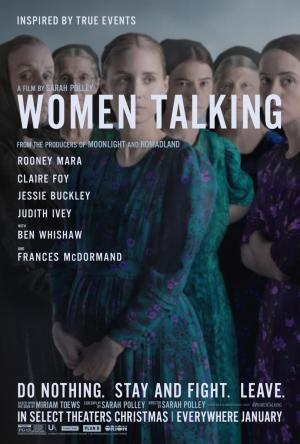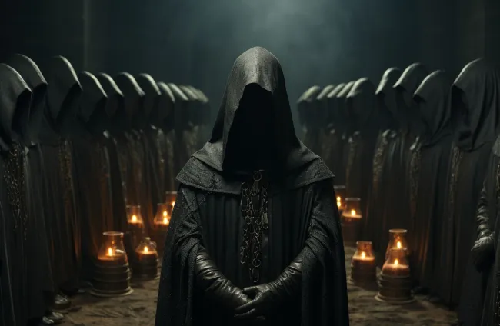"Ellas hablan", un filme necesario y pertinente | "Women Talking", a necessary and pertinent film
Estrenada en diciembre de 2022, Ellas hablan es un filme que no ha tenido la difusión y receptividad amplia que se merece. Pese a haber recibido muchos reconocimientos (como pueden ver en las referencias indicadas), ha sido casi silenciado. Las razones pueden ser varias. Una de ellas, que aborda una historia que podría ser incómoda para ciertos sectores religiosos de poder; otra, que es un filme nada "comercial", es decir, un filme que no resulta complaciente por sus características para la expectativa del espectador común; también el tema, la toma de conciencia de mujeres frente al abuso masculino y su decisión de asumir la libertad como colectivo.
Released in December 2022, Women talking is a film that has not had the wide circulation and receptivity it deserves. Despite having received many accolades (as you can see in the references above), it has been almost silenced. There may be several reasons for this. One of them is that it deals with a story that could be uncomfortable for certain religious sectors of power; another is that it is not a "commercial" film, that is to say, a film that is not complacent because of its characteristics for the expectations of the common spectator; also the theme, the awareness of women in the face of male abuse and their decision to assume freedom as a collective.

El filme está basado en la novela homónima de la escritora y actriz canadiense Miriam Toews, de 2018, que, al decir de su autora, es "una respuesta imaginaria a hechos reales". La realización cinematográfica es una adaptación muy cuidada y respetuosa de la novela, lo cual le significó a su directora y guionista, la también joven Sarah Polley, el Óscar 2023 por "Mejor guion adaptado".
En una breve síntesis, novela y filme cuentan la historia ocurrida en 2010 de un grupo de mujeres de una colonia religiosa protestante (anabaptista) que, al tomar conciencia de que ellas y sus hijas o nietas, han sido violadas sexualmente por los hombres de esa secta –una vez usado un gas adormecedor–, y ante el proclive e impune amparo de parte de sus autoridades, deciden abandonar dicho asentamiento, con su prole, en un incierto camino a su libertad, con una dura pugna interior acerca de la observancia a su fe.
Sobre el comportamiento criminal de sectas religiosas y/o políticas tenemos suficientes ejemplos en el siglo XX y lo que va del XXI, desde los crímenes del nazismo y el comunismo euroasiático, pasando por la secta de Charles Manson (por cierto, acabo de ver el filme Érase una vez en Hollywood, donde Tarantino ironiza al respecto) y la de Warren Jeffs (de la Iglesia Fundamentalista de Jesucristo de los Santos de los Últimos Días) (ver referencia aquí).
The film is based on the 2018 novel of the same name by Canadian writer and actress Miriam Toews, which, according to its author, is "an imaginary response to real events". The filmmaking is a very careful and respectful adaptation of the novel, which earned its director and screenwriter, the also young Sarah Polley, the Oscar 2023 for "Best Adapted Screenplay".
In a brief synthesis, novel and film tell the story in 2010 of a group of women from a Protestant religious colony (Anabaptist) who, upon becoming aware that they and their daughters or granddaughters have been sexually violated by the men of that sect -once they have used a numbing gas-, and in the face of the prone and unpunished protection of their authorities, decide to leave that settlement, with their offspring, on an uncertain path to their freedom, in a hard inner struggle about the observance of their faith.
We have enough examples of the criminal behavior of religious and/or political sects in the 20th century and so far in the 21st, from the crimes of Nazism and Eurasian communism, to the Charles Manson sect (by the way, I have just seen the film Once upon a time in Hollywood, where Tarantino ironizes about it) and that of Warren Jeffs (of the Fundamentalist Church of Jesus Christ of Latter-day Saints) (see reference here).

Cuenta con actuaciones de gran calidad, entre las que resaltan las de las actrices Rooney Mara, Claire Foy y Jessie Buckley, entre otras, cuyos personajes durante su interpretación son capaces de producir en nosotros, como me sucedió, la perplejidad, la incertidumbre, el dolor, incluso el rechazo. Sus actuaciones son la columna dramática de todo el filme, pues no hay acciones, sino sólo diálogos. Entre altos, bajos y continuos, nos mantienen atentos.
Pero, aparte, vale destacar la actuación de Ben Whishaw, que interpreta a un morador que ha sufrido la discriminación, y es aceptado por estas mujeres, por su actitud solidaria y crítica.
It has high quality performances, among which stand out those of actresses Rooney Mara, Claire Foy and Jessie Buckley, among others, whose characters during their interpretation are capable of producing in us, as it happened to me, perplexity, uncertainty, pain, even rejection. Their performances are the dramatic backbone of the whole film, since there are no actions, only dialogues. Between highs, lows and continuity, they keep us attentive.
But, apart from that, it is worth mentioning the performance of Ben Whishaw, who plays an inhabitant who has suffered discrimination, and is accepted by these women, because of his supportive and critical attitude.

El otro aporte importante en el filme es el de la música hecha por Hildur Guðnadóttir, otra joven artista, ya muy reconocida, al obtener el Óscar por Joker en 2020.
The other major contribution in the film is the music made by Hildur Guðnadóttir, another young artist, already well recognized, having won the Oscar for Joker in 2020.
Unos comentarios generales sobre el filme
La mayor relevancia para mí no la tiene, en principio, lo que sería principal: el reconocimiento del abuso criminal en las mujeres por parte de los hombres de su propio asentamiento, sino el debate acerca de cómo asumir esa realidad y la opción a tomar frente a ello. La confrontación no es sólo contra los crímenes cometidos (que son muchos, y cada vez más), sino como el enfrentamiento a un patriarcado "normalizado", que llega a esos extremos, lamentablemente aceptados o "perdonados".
Precisamente, uno de los tantos valores de este filme es presentarnos el conflicto interno y el colectivo (del grupo de mujeres reunidas) en un diálogo de diferentes respuestas, donde se hacen visibles las contradicciones y dudas de ellas. Por eso, ser un filme sólo de diálogos, lo convierte en una realización de sumo interés.
Some general comments on the film
The greatest relevance for me is not, in principle, what would be the main one: the recognition of the criminal abuse of women by the men of their own settlement, but the debate about how to assume that reality and the option to take in front of it. The confrontation is not only against the crimes committed (which are many, and more and more), but as the confrontation to a "normalized" patriarchy, which reaches these extremes, unfortunately accepted or "forgiven".
Precisely, one of the many values of this film is to present the internal and collective conflict (of the group of women gathered) in a dialogue of different answers, where their contradictions become visible. For this reason, being a dialogue-only film, it makes it a very interesting film.
Referencias | References:
https://es.wikipedia.org/wiki/Ellas_hablan
https://es.wikipedia.org/wiki/Women_Talking_(film)
https://en.wikipedia.org/wiki/Women_Talking_(novel)
https://es.wikipedia.org/wiki/Miriam_Toews
https://en.wikipedia.org/wiki/Miriam_Toews
https://es.wikipedia.org/wiki/Sarah_Polley
https://en.wikipedia.org/wiki/Sarah_Polley
https://www.filmaffinity.com/ve/film227602.html

Gracias por su lectura | Thank you for reading.





https://inleo.io/threads/josemalavem/re-josemalavem-2wht7v8tw
The rewards earned on this comment will go directly to the people ( josemalavem ) sharing the post on LeoThreads,LikeTu,dBuzz.